The Story Behind Wall Street: Money Never Sleeps
How Stone & Douglas Made Greed Good Again
Greed is good...but lunch is for wimps.
Wall Street: Money Never Sleeps - Oliver Stone's much-anticipated sequel to his seminal story of 1980s excess - was originally scheduled to open in cinemas this Spring.
However, rather than opt for a quick bite, Fox has put the release back to September, with a world premiere at Cannes serving as an appetite whetter.
And what a feast it promises to be.
With Michael Douglas reprising his Oscar-winning turn as crooked trader Gordon Gekko, a new generation of acting talent alongside him, and a hugely topical story of bad banks and financial turmoil, there's more than enough for us to get our teeth into.
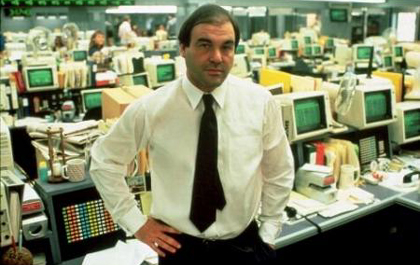
"What's worth doing is worth doing for money"
Fresh off winning Best Picture and Best Director for his Vietnam War classic Platoon , Oliver Stone was eager to get back into movie-making rather than risk getting stale.
Sign up for the Total Film Newsletter
Bringing all the latest movie news, features, and reviews to your inbox
For inspiration, he turned to his father, whose career had been in stockbroking. Stone recalls, as a child, being "scared by Wall Street. I remember these tall men, big buildings, money."
But he also respected his father's integrity, and wanted to put that world on the screen. He told Fortune, "He took me to the movies, and he would bemoan the lack of a good business movie. Businessmen were generally lampooned."
Stone's story collided old-school values with the corruption he saw in the 80s corporate raiders. He tells how tyro trader Bud Fox signs a deal with a financial devil in the form of flashy Gordon Gekko, whose wealth is reflected in his loud shirts, braces and then-novel mobile phones.
Michael Douglas and Platoon star Charlie Sheen were cast as Gekko and Fox, with the latter's on-screen father played by Charlie real-life dad Martin Sheen.
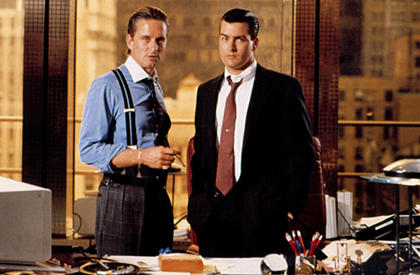
Extensive research drew authenticity. Sheen and John C. McGinley spent a month shadowing traders to get themselves into the caffeinated rhythms of traders' high-pressure lifestyles, while some roles went to genuine Stock Exchange workers.
For Gekko, Douglas and Stone drew on several real-life white collar criminals, notably Ivan Boesky, who made millions insider trading on corporate takeovers he knew were sure things. It was Boesky who said, "I think greed is healthy. You can be greedy and still feel good about yourself".
Stone's intent had been to contrast Gekko's predatory lack of ethics with the virtue of old-timers like Hal Holbrook's Lou Mannheim who, according to Stone, "represents my father, who always said Wall Street can do a lot of good. It is not simply a function of making money."
However, Douglas' captivating charm drew most plaudits, making a shitload of money for the movie, bagging an Oscar, and directly inspiring a new generation of financial whizzkids apparently incapable of seeing that he was supposed to be a villain.
It's a time capsule of a bygone era...right?
Next: It's all about bucks, kid. The rest is conversation [page-break]
"It's all about bucks, kid. The rest is conversation"
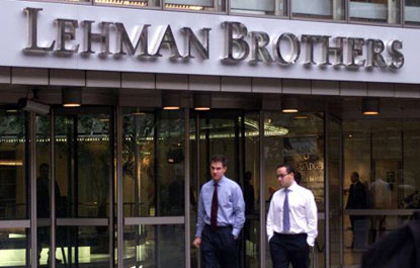
In May 2007, almost two decades after principal photography on Wall Street commenced, a sequel was announced, with the first film’s screenwriter Stanley Weiser providing a treatment, and Lolita and Leatherheads screenwriter Stephen Schiff also attached.
Later that year, producer Edward R. Pressman explained the thinking behind the sequel. " Wall Street was New York-centric. Today the markets are much more global, hence the title of the new film, Money Never Sleeps ."
Weiser confirmed the international focus, saying that "the latter part was set in China and dealing with Chinese money and policing the Chinese.”
However, things were about to change.
Banks overextended credit to provide low income households with cheap loans– the so-called sub-prime mortgages. When homeowners defaulted, the banks suddenly found themselves strapped for cash and unable to pay back the huge sums they’d gambled on.
When the high-profile Lehmann Brothers bank declared bankruptcy, all hell broke loose.
As the scale of the crisis became apparent, Fox was stuck with a period piece. “Fox put it in turnaround because it was dated,” Weiser explained. “Everything has changed and they’re starting with a page one rewrite that deals with the current situation in the markets.”
The new writer was Allan Loeb, a writer famed for bringing his unique real-life experience into drama. As a recovering gambling addict, he injected realism into the screenplays for 21 and Things We Lost In The Fire .

But Loeb was also a licensed stockbroker who once worked at the Chicago Board of Trade, giving him a privileged insight into how things work on Wall Street.
Loeb gave an inkling of the new film’s intended direction when he talked about Bernie Madoff, the crooked high-flyer behind a Ponzi scheme that defrauded millions.
“The thing that is so crazy about this story is that Ponzi schemes seem to be the simplest low-class scam. But this was carried out in the highest-echelon of high-finance. You couldn't even get in to see this guy unless you had $2 million to invest."
20th Century Fox spokesman Gregg Brilliant confirmed the topicality of Loeb's treatment. "It’s literally ripped from today’s headlines. It’s going to be very big and very cool.”
The film was back in play, but where was Oliver Stone?
Next: We make the rules, pal [page-break]
"We make the rules, pal"
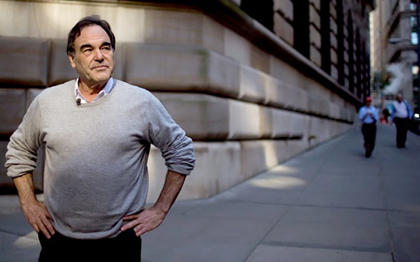
In October 2008, just after the Lehmann Brothers collapse, Oliver Stone declared to Total Film that he was uninterested in the Wall Street sequel.
“I have to do it for a reason, an underlying reason. What I'm seeing is a hell of lot more greed…The Gordon Gekkos have been swallowed by banks. It'd be very hard for a Gordon Gekko to operate these days at that level."
He expanded on those thoughts to The Times while promoting W . “I don’t even think a Gordon Gecko could exist in 2008, not as an individual buyer or seller. He’d have to work for a bank. Those guys – they pigged out, man, to a degree that I never thought was possible.”
But Loeb's spin on current events renewed Stone's interest in the material. "I got a script that hooked me."
Once Stone was in, he quickly put his stamp on proceedings. First decision: the scope would be much wider than a rogue operator like Madoff. As he told the NY Post: "Listen, guys we're dealing with are heavies. Compared to them, Madoff was chickens.”
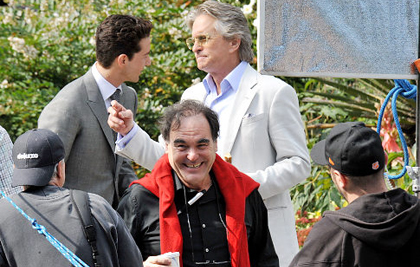
Just as he did first time around, Stone prepped by talking to the people in the know. "We're in depth with 15-20 top lawyers, bankers, traders constantly. Going through everything for the facts.
"When it's too complicated, we have to change the dialogue and remember that this story is not about words, it's about people. About what money does to people. We're talking greed and envy."
One crucial advisor was Nouriel Roubini, a New York University economics professor and chairman of a consulting firm, who had predicted the stock market collapse as early as 2006.
“In this financial crisis it was the traditional banks and the investment banks that had a larger role in doing stupid and silly things than the hedge funds,” Roubini confirmed, validating the thrust of Loeb’s wide-ranging expose of the system.
Roubini’s reward: a small role in the film – one of many famous names from the financial world to appear in the film, with Donald Trump also touted to make a cameo.
But with Stone on board, there was only one (fictional) businessman that mattered: Gordon Gekko himself. Where was Michael Douglas?
Next: If you need a friend, get a dog [page-break]
"If you need a friend, get a dog"
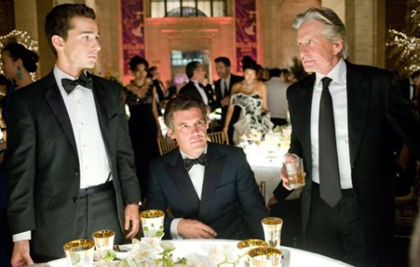
Michael Douglas will be the first to admit that his career is going to be defined by Gordon Gekko.
Before accepting his Lifetime Achievement Award from the AFI last year, he remarked that audiences give Gekko the "same kind of respect we’ve got for the great white shark."
“He’s a villain. Gordon Gekko is a great, old-fashioned villain. And, interestingly enough, if you look at most actors’ careers, their biggest achievement... is playing a bad guy."
That said, he was all too aware of the irony that, to those who lived the Gekko lifestyle, he was a hero. "I wouldn't mind if I never had one more drunken Wall Street broker come up to me and say, ‘You’re the man!’"
So why reprise the role?
As he explained while promoting Solitary Man . "Look, I got an Oscar for the first one, so what's not to like?! You have the confidence of an archetypal character like Gekko."
He expanded on the new film to Ellen DeGeneres last Summer, "We kind of deal with all of the issues that are going on now, it's an excellent script and I'm really excited by it."
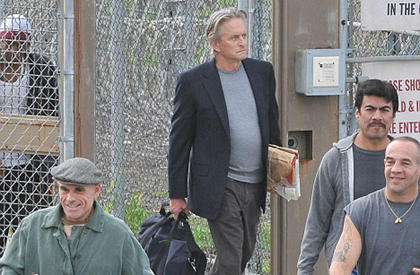
Stone and Loeb were able to offer a new slant on the character, who begins the movie a paroled convict. "When Gekko comes out of prison in the beginning of this movie, he essentially has to redefine himself, redefine his character,” Stone explains. “He’s looking for that second chance.”
The director told Total Film that Douglas suits the new Gekko. "He is obviously in a different place now. But he is a very effective Gekko. Because he has gone through his share of changes, and it reflects in his face, which is appropriately craggy and older. Certainly hollowed out with more suffering.
"That's what was required for the character. He is no longer the old Gekko. Those people who look for the old Gekko won't find him."
As the story develops, Gekko is presented with an opportunity both to patch things up with his estranged daughter and pit his wits against a new breed of stock-guzzling shark, when a young trader asks him for help.
As Douglas remarked cryptically to Total Film, "Can a leopard change his spots? I guess if he does enough jail time, he probably can. But greed must be like a drug. People just can't get enough."
With Douglas and Stone on board, the sequel was all set - but doesn't Gekko need an echo?
Next: I don't throw darts at a board. I bet on sure things [page-break]
"I don't throw darts at a board. I bet on sure things"
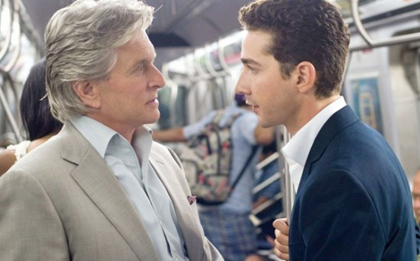
Wall Street was defined by the relationship between Gekko and Charlie Sheen's naive trader Bud Fox. For the sequel, Stone wanted the same dynamic and found his young leading man battling transforming robots.
Shia LaBeouf was cast as Gekko's new protege - and boyfriend of Gekko's daughter - Jacob Moore, who is determined to get his revenge on Bretton James, the hedge fund manager he holds responsible for the death of his mentor, Lewis Zabel.
The young star knew that this is his chance to convince sceptics he's more than just a buster of blocks, but admitted being daunted by at playing in "wordy, heady" movie about finance.
“I don’t know what a credit derivative is,” he commented. “I have no idea. I don’t know what a CPO is. IPB. LVC. You gotta know ticker names.” But such was his dedication that he decided to find out exactly what those names meant.
Like Sheen in the 1980s, LaBeouf hung out with real-life stockbrokers. He recently told GQ: “I thought my life was pretty wild. I’m Richie Rich. I land in New York, secretly thinking I’m like the coolest guy in the world.
"But then I met these guys, and it’s humbling. It’s the most sex-drugs-and-rock-’n’-roll atmosphere that exists on the planet. I was hanging out with some wild human beings."

However, he was quick to learn, using his contacts to dabble in investments. Before he knew it, he'd turned an initial $20,000 investment into $489,000... but as he explained to Jimmy Kimmel, it was "with the help of the entire team!"
Oliver Stone was impressed. "I don't play [the market] like these guys. Or like Shia. As a result of this movie, Shia's really learned. He's into it. He trades daily."
As for Bud Fox himself, might Charlie Sheen be making an apperance? According to screenwriter Allan Loeb, that's a bingo.
"It's a good exchange between Gordon Gekko and Bud Fox. Without revealing too much, I'd like to say that the cameo sends the message that Bud Fox kind of figured out after prison... what Gordon Gekko never can figure out.
"Bud Fox in this cameo, you get the idea that he gets it, he gets that life is not all about dollars and cents."
Michael Douglas, Shia LaBeouf, Donald Trump, Charlie Sheen. That's some cast Stone is putting together. Who else is in the mix?
Next: If you're not inside, you're outside! [page-break]
"If you're not inside, you're outside!"

The film's lead female role - at the centre of a bizarre love triangle - is Winnie Gekko, daughter of Gordon and girlfriend of Jacob Moore.
It's the sort of role to attract the hottest Hollywood starlets, right? Er, not exactly. This showcase part went, instead, to a Brit.
Specifically, Carey Mulligan - now the talk of the town thanks to her acclaimed, Oscar-nommed performance in An Education - but back then, her imminent breakthrough was a secret known only to Sundance insiders who had witnessed her portrayal of London schoolgirl Jenny.
Mulligan had to convince as an American, and not just any American. Her accent - she explained to Rolling Stone's Peter Travers - is "Wall Street American... Upper East Side, slightly rich girl."
As the only girl on set most days, Mulligan had every right to be intimidated. Not a bit of it, she told ScreenCrave recently:
"Every story you have ever heard about Oliver just goes out the window when you meet him and he’s great. He didn’t mollycoddle me which I kind of enjoyed. He treated me like one of the boys."
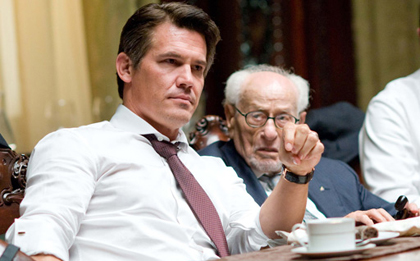
As Bretton James, the villain of the piece, Stone initially sought Javier Bardem. However, the Spanish giant signed instead to star in Julia Roberts rom-com Eat, Pray, Love .
In an intriguing twist, the role went instead to Bardem’s No Country For Old Men co-star Josh Brolin, who of course played George W. Bush for Stone.
Rounding out a cast chock full of talent are Susan Sarandon as LaBeouf’s mother, and Frost/Nixon ’s Frank Langella as Shia’s mentor, whose death sends shockwaves through the financial community. Eli Wallach also appears in an unspecified role.
With an astounding cast in place, there was just the small matter of actually filming.
Next: Somebody wins, somebody loses [page-break]
"Somebody wins, somebody loses"
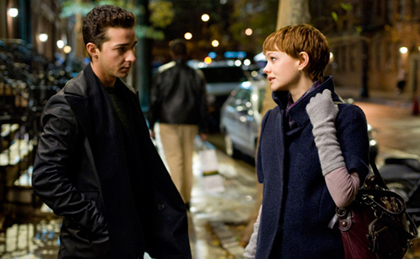
The shoot kicked off in September in Manhattan, with Stone determined - as in Wall Street - to utilise real locations where possible.
To highlight the differences with the first movie, with its frequent footage of frenzied trading on the Stock Exchange, here several key scenes were filmed in the Federal Reserve Building.
Stone told the New York Times: “In the original ’87 movie there was no Federal Reserve, we didn’t get into that. But now the world has changed radically. This is part of the bulwark of the system.”
However, further versimilitude was injected into proceedings when on-screen couple LaBeouf and Mulligan started dating for real. As Stone wryly remarked to the NY Post, "I seem to be a good casting director."
Quizzed by OK! about her newfound pap-snap celeb status, Mulligan remarked of LaBeouf, "[He] understands how you can fall in love with the cast and the cast becomes your family.
"It's hard for people who aren't actors to understand how reliant you become on the people around you and how much you can get swept away by a character. You don't mean to but you just do and you are completely consumed by it, but it's lovely."
Aww. However, while everything was sweetness and light for the young stars, stormclouds were looming in Douglas' life.
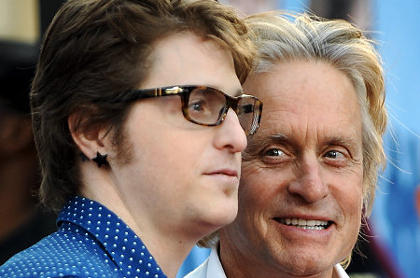
On 28th July 2009, his son Cameron was arrested by the DEA for possession of half a pound of methamphetamine, enough to get him charged with intent to distribute - an imprisonable offence.
The shoot progressed against this backdrop and LaBeouf, for one, noticed the toll it was taking on his co-star. "Michael Douglas was an open wound on the set," he told GQ somewhat indiscreetly. "That dude is in pain. He was emotional putty on the set. A struggling man. We filmed a struggling man."
Douglas himself was more circumspect in interviews, no doubt aware that this was a case of life imitiating art - specifically, his role in Traffic as father to a drug addict.
He told Vanity Fair earlier this year, "Anybody who has a relative or child in substance abuse has some idea of what this feels like. This is one of those worst-case scenarios.
“It will ultimately be a painful lesson and very expensive as far as time is concerned. I don’t wish it on anybody, but then, you know, look, everybody’s got difficult things in life.”
So it proved. Things got worse for Cameron after he was caught in posssession of heroin while on house arrest, smuggled to him by his girlfriend inside an electric toothbrush.
On 20th April, after pleading guilty to all charges, Cameron Douglas was sentenced to five years in prison.
By then, the release of Wall Street: Money Never Sleeps had itself been put on hold.
Next: Stick around pal, I've still got a lot to teach you [page-break]
"Stick around pal, I've still got a lot to teach you"
The teaser trailer for Wall Street: Money Never Sleeps arrived in January, slyly commenting on the differences between then and now.
As Gordon Gekko is released from prison, his belongings - including an oversized, 80s vintage mobile phone - are returned to him. In voiceover, he remarks, "Someone reminded me, once I said, 'Greed is good.' Now it seems it's legal."
The full-length trailer arrived soon after, soundtracked - aptly - by Sympathy For The Devil . It's easy to get in, it's hard to get out," promises Gordon Gekko.
Oh, the irony.
On 10th March, Fox confirmed that the original 21st April release date was being pushed back to 24th September.
Officially, the reason given was that the film was better suited for an Autumn release where it could avoid the congestion of a packed summer schedule, with studios already navigating an anticipated fall in attendances worldwide - if not America - while the World Cup is on.
It no doubt helped that a similar delay certainly didn't harm Shutter Island from achieving career-best box office for Martin Scorsese and a generally favourable reception from critics. With cameras still warm from the end of the shoot, the delay provides Stone with extra time to fine-tune his edit.
“I think they decided September, the fall, was always a better time for that picture," Michael Douglas suggested recently. "It was always relatively unrealistic for a picture that was finishing shooting just before Christmas to be released in April."
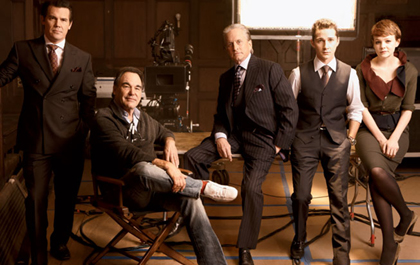
Meanwhile, industry insiders such as Variety reported rumours that another reason for the postponed release was the possibility of a prestigious slot at the 2010 Cannes Film Festival.
On 15th April, that speculation turned out to be well-founded, as Wall Street: Money Never Sleeps was announced as Cannes' closing night gala premiere.
Amazingly, it's Stone's first film to strut its stuff on the Croisette - proof, if any more were needed, that Gordon Gekko remains a significant cultural force. Greed, for want of a better word, est bon .
Wall Street: Money Never Sleeps premieres on Sunday, 23rd May.
Like This? Then try...
Sign up for our free weekly newsletter here .
Follow us on Twitter here .


